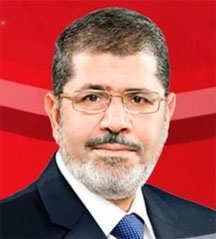CAIRO, (Reuters) – Tens of thousands Egyptians protested yesterday against President Mohamed Mursi in one of the biggest rallies since Hosni Mubarak’s overthrow, accusing the Islamist leader of seeking to impose a new era of autocracy.

Police fired tear gas at stone-throwing youths in streets near the main protest in Cairo’s Tahrir Square, heart of the uprising that toppled Mubarak last year. Clashes between Mursi’s opponents and supporters erupted in a city north of Cairo.
But violence could not overshadow the show of strength by the normally divided opponents of Islamists in power, posing Mursi with the biggest challenge in his five months in office.
“The people want to bring down the regime,” protesters in Tahrir chanted, echoing slogans used in the 2011 revolt.
Protesters also turned out in Alexandria, Suez, Minya and other Nile Delta cities.
Tuesday’s protest called by leftists, liberals and other groups deepened the worst crisis since the Muslim Brotherhood politician was elected in June, and exposed the deep divide between the newly empowered Islamists and their opponents.
A 52-year-old protester died after inhaling teargas in Cairo, the second death since Mursi last week issued a decree that expanded his powers and barred court challenges to his decisions.
Mursi’s administration has defended the decree as an effort to speed up reforms and complete a democratic transformation.
But opponents say Mursi is behaving like a modern-day pharaoh, a jibe levelled at Mubarak. The United States, a benefactor to Egypt’s military, has expressed concern about more turbulence in a country that has a peace treaty with Israel.
“We don’t want a dictatorship again. The Mubarak regime was a dictatorship. We had a revolution to have justice and freedom,” 32-year-old Ahmed Husseini said in Cairo.
The fractious ranks of Egypt’s non-Islamist opposition have been united on the street by crisis, although they have yet to build an electoral machine to challenge well-organised Islamists, who have beaten their more secular-minded rivals at the ballot box in two elections held since Mubarak was ousted.
MISCALCULATION
“There are signs that over the last couple of days that Mursi and the Brotherhood realised their mistake,” said Elijah Zarwan, a fellow with The European Council on Foreign Relations, adding the protests were “a very clear illustration of how much of a political miscalculation this was.”
Mursi’s move provoked a rebellion by judges and has battered confidence in an economy struggling after two years of turmoil. The president still has to implement unpopular measures to rein in Egypt’s crushing budget deficit, action needed to finalise a deal for a $4.8 billion International Monetary Fund loan.
Some protesters have been camped out since Friday in Tahrir, and violence has flared around the country, including in a town north of Cairo where a Muslim Brotherhood youth was killed in clashes on Sunday. Hundreds have been injured.
Supporters and opponents of Mursi threw stones at each other and some hurled petrol bombs in the Delta city of el-Mahalla el-Kubra. Medical sources said almost 200 people were wounded.
“The main demand is to withdraw the constitutional declaration (decree). This is the point,” said Amr Moussa, former Arab League chief and presidential candidate who has joined the new opposition coalition, the National Salvation Front. The group includes several top liberal politicians.
